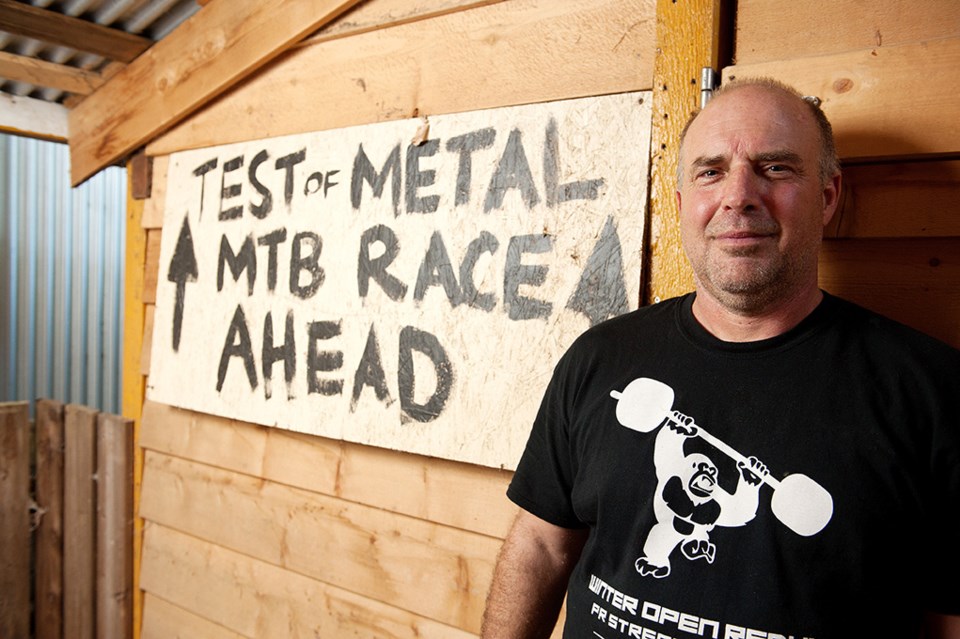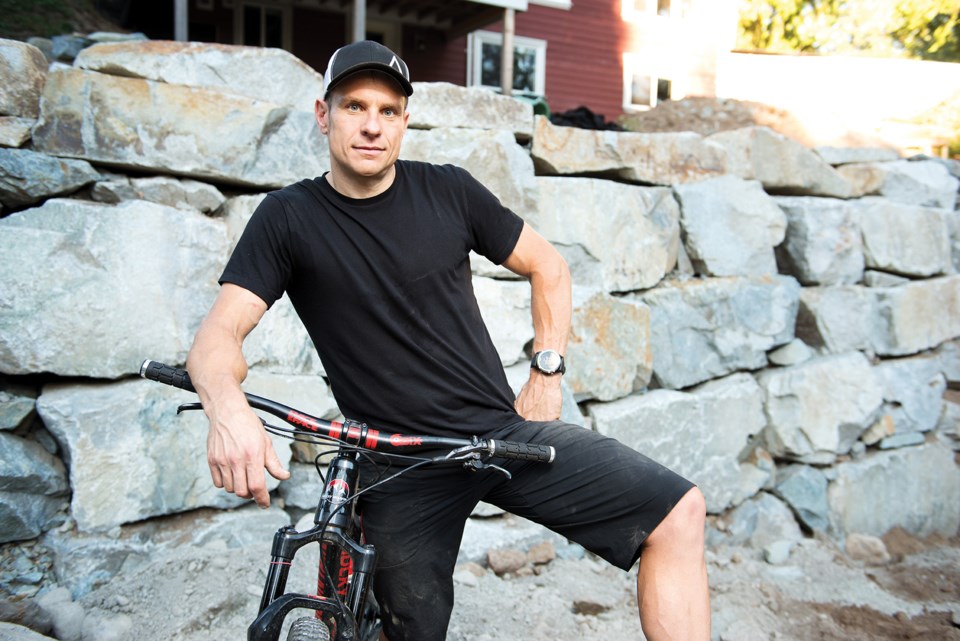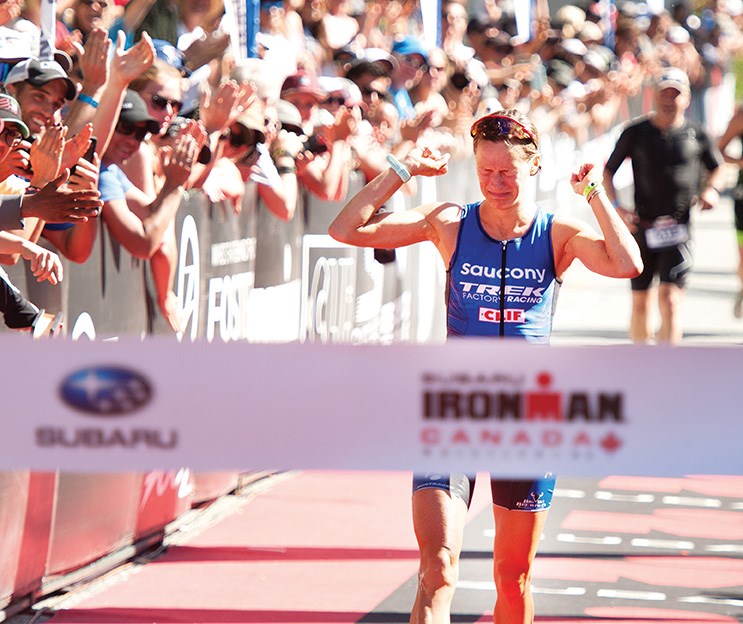Squamish is, as anyone who lives here is well aware, the Outdoor Recreation Capital of Canada, and as a result now attracts people from all over the world to play.
Often, those who either pedal or run for their recreation want to test themselves while doing so. And the races, the events that attract those types of competitors have become big business.
Billionaire Wanda Dalian has bought the grueling Ironman Triathlon, along with dozens of other races across North America. The RBC GranFondo Whistler, which brings thousands of riders through Squamish, has grown in international appeal since its inaugural ride in 2010.
However, with all of the growing interest in various types of cross country, endurance sports, one of the originals, Squamish’s own Test of Metal, ran its last race in 2016.
“There were about 101 reasons for ending it [the Test of Metal] but I think mainly we wanted to go out on a high note,” said Cliff Miller, who founded the Test of Metal twenty-one years ago with Kevin McLane.
“Twenty-one years ago we were just sitting around drinking beers, thinking it would be a fun thing to do. We went to city hall and they said, ‘You want to do what?’”
But, said Miller, times have changed, the market has evolved and most critically, he feels the community didn’t support the race in recent years, in the same way as in earlier years.
“Grassroots? We lost grassroots a long time ago. When we started, people lived and worked in Squamish, the newcomers, they’re commuting north and south, most of what they see of Squamish is their garage door, they just don’t have time to volunteer.”

Dwayne Kress, whose Sp’akw’us 50 is largely seen as the replacement race for Test of Metal, agrees that grassroots races are largely a thing of the past.
“Yes, I can reinforce what Cliff said, in the early years of Test of Metal there was a fantastic volunteer community…. Now people just don’t have time. We don’t have the volunteer base there used to be. Part of the challenge in doing Sp’akw’us 50 was in trying to build a new volunteer corp.”
Miller, nor anyone else involved with event type races, thinks corporate sponsorship is a bad thing. The Test of Metal relied on sponsors, as does Sp’akw’us 50, in fact both are quick to acknowledge it is only through corporate sponsorship these races can exist.
“The first year of the Test of Metal I was able to put the whole thing on my credit card and carry the balance until entry fees started coming in,” said Miller, noting that was the first and last time he did that.
“You can’t do a race on just entry fees,” said Kress. “If you don’t have some sort of corporate sponsorship out of the gate, and you’re trying to run it just on entry fees then your race is probably falling short. Just on permits alone, its almost impossible to do it on just race entries. You need sponsors.”
Corporate sponsorships are key to any event race, but the races themselves must also be run as a business.
“The reason you run a race as a business? One word, sustainability,” said Kress. “I had to become an advocate for trails, for the District, for developers, it all took so much time at every step, so you have to ask yourself, is it sustainable? And for it to be sustainable you need a passionate individual to carry the torch.
“Cliff [Miller] drilled that into me, always be on the lookout for someone to pass the torch to. Cliff’s approach is still a guiding principle for me. I’ve been fortunate to have that— someone with his perspective and experience to learn from, which was something he didn’t have.”
Both Test of Metal and Sp’akw’us 50 operate as non-profit societies. Because of the popularity of Test of Metal, Miller acknowledges they were approached several times about selling the race and the brand, which they did not feel was right.
Kress however, does plan to sell Sp’akw’us and related races.
“Next year I’ll tweak the model, it will be a business. I want to provide incentive to someone who wants to take this over and continue it.
Kress explained that incentive would come in the form of a salary for the race director and stipends for key volunteers.
That is people who work throughout the year, people, Kress describes as doing the heavy lifting before race day, the often understated, but critical work behind the scenes.
Miller agrees running an event race is a full time job, but one he declined to profit from.
“The beauty of Test of Metal Inc. was that it had so many great people involved that was the cornerstone of the race. For twenty-one years it was done strictly on a volunteer basis. I didn’t draw a salary, why should I when everyone else is working for free?”
Gary Robbins, a founder of the Squamish 50 and Coast Mountain Trail Series, all enduro trail running races, runs his events as a business, and has done so since day one. That said, he does rely on volunteers, and unlike Miller and Kress feels that the grassroots organizing spirit is very much alive in Squamish.
“We have a good relationship with the District, we’re very professional, and we have 250 volunteers we rely on. Grassroots is very much alive,” said Robbins. “We have a tremendous community feel here [Squamish]. We get runners from over 20 countries; in six years the entire German team has come four out of six times, international runners can’t say enough about our race [the 50]. The setting of Squamish is what attracts many competitors, but it’s the experience of the race and what we provide that brings them back year after year.”
Like most who take on the challenge of event races, it is first and foremost a labour of love. Robbins has been involved in the sport of long distance, cross country trail races for 15 years, and has watched it grow in popularity.
The Coast Trail series is now in its fifth year and the Squamish 50 in its sixth year.
“We had 350 runners in the first year, we now cap at 1,200 and the race sells out in hours.”
Robbins makes it clear, while the races are his business, they are also good business for the region.
“We did an economic impact study, and we estimate the Squamish 50 generates a million dollars in economic activity.”
And for all of that economic activity, Robbins says his races provide good value for dollar.
“There are other races that cost more and don’t provide as much.
We’re one of the most cost effective. Also, one thing we do is we take five dollars of every entry fee and donate to local Search and Rescue or a local trails society” (this year SORCA was the beneficiary).
Lance McClure is the proprietor of Galileo Coffee Company in Britannia Beach, which is a stop-off point for the Sea to Sky Gran Fondo. He has been active in the Squamish cycling community since moving here 14 years ago and encourages and promotes Squamish recreation wherever and whenever he can. He says, ‘Squamish wants to play’ should be its slogan. But he, too, wonders just how deep the volunteer pool can go.
“The new race [Sp’akw’us 50] is also grassroots, and Squamish 50 and others. The grassroots is still there, but there’s only so much energy.”
The GranFondo has been a boon to McClure’s business, but he has always supported local races in any way he could, and says he will continue to support any race that wants it. But like Kress and Miller, he wonders, outside of a billionaire footing the bill, how many races can Squamish support?
“Deeper pockets, of course, helps. Otherwise, you’re always raising money, and for someone with a full-time job, it’s hard to have another full-time job.”
Still, these races are more popular than ever. As McClure says, a lot of people are transitioning from more traditional sports to multi-dimensional, long distance cross country trail racing.
“It has exploded, adventure racing is just getting bigger. I think it’s all about the experience. Look at how cross fit and other things like boot camp, have also exploded, people want variety.”
Will Squamish, with its wealth of incredibly fit people, become the birthplace of an internationally branded race like Iron Man, or obstacle race series like Tough Mudder or Spartan Race? All of which started as local grassroots organized races that are now held in locations around the world.
“What [from here] could translate to an international race? The Tough Mudder you can do anywhere. There are very few places like Squamish, it’s a great location for adventure races and cross-country stuff, but I don’t think there’s something corporate coming out of Squamish,” McClure said.
“And for Squamish I think that’s fine, I think the whole corridor’s fine. These races could be a good industry for Squamish, and that’s what we want. The demographic in Squamish has changed radically in fourteen years. We’re all about rec.”
Robbins agrees he sees the races he runs as integral to their location and not something that can easily translate to other locales.
Though the question remains, how many cross-country, enduro races can Squamish accommodate? “
Squamish is being ‘evented’ to death,” said Miller. “Every weekend there’s another race, eventually you’re going to get volunteer fatigue, and sponsorship fatigue. Ironman has paid administrators, and they need it, the race couldn’t work otherwise, but they still rely on volunteers.
“People are busier than they were, things are more expensive. They have less time, and less money, so that makes it hard.
If corporate sponsorships dries up then event fees will go up.

Will there be event burn out? Kress feels the limit will ultimately come down to the number of volunteers available.
“There is talk of an entirely professional circuit,” said Kress. You can’t do it ad hoc anymore, it is a business.”
Kress says he sees that development as the maturation of the sport of cross-country racing. For events to go on, they will have to be professionally run. And he adds, the end product has to serve clients, it has to deliver value.
“The reason to put on any event, whatever that is, is to serve the interests of the core market and run it as a business, otherwise there will be no events.”
But despite the challenges, local events keep multiplying,
“I was riding the trails yesterday and saw signage from an event that I don’t even know what it was for,” said Kress.
But as Miller points out, these things come in cycles, cross country enduro is big now, but 21 years ago there was nothing like the Test of Metal.
“I don’t know what the next big race idea will be, but I know it will start at the grassroots level.... And whatever it is I’ll be on the sidelines enjoying it,” laughs Miller.



